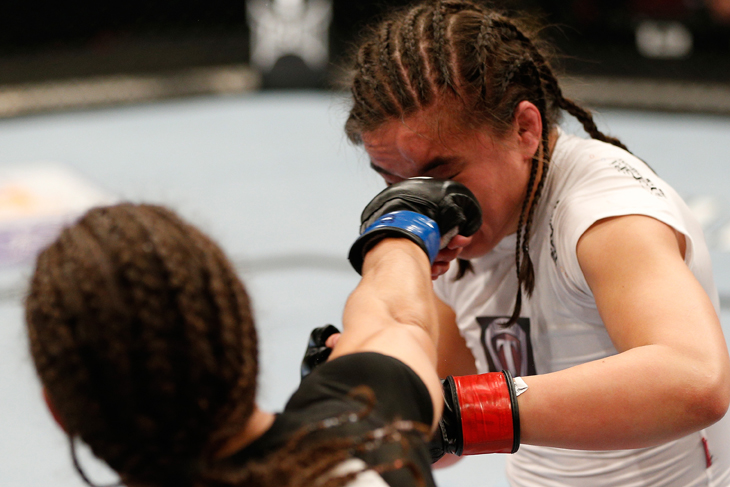 In that euphoric moment when a fighter who, seconds before, had been virtually out cold, rallies to win a significant bout, no one is thinking of concussions or traumatic brain injuries or Chronic Traumatic Encephalopathy (CTE) or subdural hematomas or death.
In that euphoric moment when a fighter who, seconds before, had been virtually out cold, rallies to win a significant bout, no one is thinking of concussions or traumatic brain injuries or Chronic Traumatic Encephalopathy (CTE) or subdural hematomas or death.
They're too busy cheering the stunning turnaround, hailing a fighter who was victorious against almost invincible odds.
There have been many such miraculous comebacks in the UFC, one of the reasons we've fallen so deeply in love with the sport. Cheick Kongo scored a win out of nowhere over Pat Barry in a fight in Pittsburgh's Consol Energy Center which he was seconds away from losing by knockout.
[Related: Megafights set for UFC 169]
Frankie Edgar rallied to retain his lightweight title after being dropped multiple times and on the verge of going out against Gray Maynard at UFC 125. Tim Boetsch was battered and beaten and hopelessly out of the fight when he came out of nowhere to defeat Yushin Okami at UFC 144.
There have been no deaths in the cage in the UFC's 20-year history, and, as best as is known, none of its fighters have suffered traumatic brain injuries.
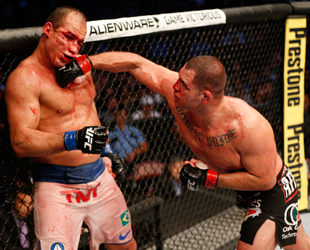 This is due in large part to safety procedures set in place before a card begins. Fighters are thoroughly checked medically before they're cleared to fight.
This is due in large part to safety procedures set in place before a card begins. Fighters are thoroughly checked medically before they're cleared to fight.
Doctors, paramedics and ambulances are on hand at every arena to treat fighters in distress.
UFC fighters are among the greatest sportsmen in the world, as Lyoto Machida showed on Saturday when he failed to take advantage of an out-cold Mark Munoz in the main event of a card in Manchester, England. Machida knocked Munoz down with a kick to the head, and got to the prone Munoz before the referee.
The rules allowed Machida to try to punch the downed Munoz -- What ex-heavyweight champion Randy Couture called the sport's "rules of engagement" after a loss to Brock Lesnar at UFC 92 -- but Machida recognized Munoz was out and defenseless and never threw another punch.
The referee then quickly stopped the fight. By declining to throw that extra punch or two before the referee intervened, Machida may have saved Munoz a serious brain injury.
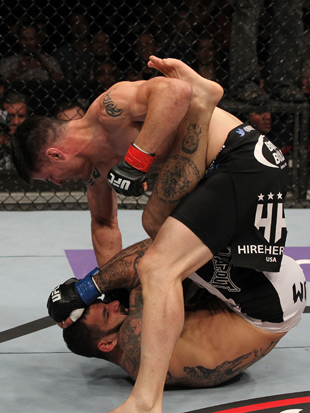 Brian Stann did the same thing in a fight last year with Alessio Sakara. Their restraint, and that of numerous other fighters who have reacted similarly when they realize the opponent is helpless, has been another factor why there haven't been any deaths or traumatic brain injuries.
Brian Stann did the same thing in a fight last year with Alessio Sakara. Their restraint, and that of numerous other fighters who have reacted similarly when they realize the opponent is helpless, has been another factor why there haven't been any deaths or traumatic brain injuries.
Much of the credit for the UFC's terrific safety record, though, should be given to the referees, who very literally have the fighters' lives in their hands, and repeatedly show good judgment.
But once in a while, a fight goes on too long and a debate is stirred. It's happened in the last two UFC shows. Many were critical of referee Herb Dean for not stopping the heavyweight title fight between Cain Velasquez and Junior dos Santos at UFC 166 in Houston earlier.
Velasquez was pummeling dos Santos from the bout's opening seconds, and by the end of the third round, there were calls for Dean to stop the bout. But Dean let dos Santos continue until the fifth, when dos Santos went down and Velasquez delivered a series of unanswered blows from the top.
On Saturday in Manchester, Jessica Andrade routed Rosi Sexton in a fight that referee Neal Hall let go the three full rounds. Many thought it should have been stopped, including UFC television analyst Joe Rogan. Sexton, though, took a shot at what she felt was Rogan's over-the-top commentary.
48 hours post fight - I have 2 black eyes, otherwise I'm 100% fine. You could have given me an IQ test as I stepped out of the cage, and I'd still have scored higher than Joe Rogan.
Long-time MMA journalistDamon Martin suggested in a column on Fox Sports that Hall made the right move allowing the fight to continue.
He suggested gender bias led to all the calls for a stoppage, when there were not similar cries when males were being similarly beaten.
If the conversation is about when a fighter is being too tough for their own good or when to account for too much punishment in a fight, then that's a subject worth putting under the microscope but it has to go there without an ounce of gender bias. Referees and corners need to undergo training and watch fight footage and have to understand when enough is enough and be willing to make those calls regardless of the public backlash that may occur because a fight was deemed as stopped too early.
The same goes for corners who are there on behalf of the fighters, and they need to be willing to stop the action and deal with the fallout from fellow coaches and the fighter for making a judgment call.
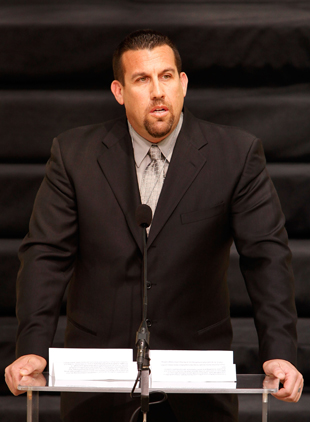 The problem with Martin's thinking is that while someone may have made an error by not stopping a previous fight, the same error shouldn't be repeated, because there can be dire consequences to allowing a fighter to take too many blows to the head.
The problem with Martin's thinking is that while someone may have made an error by not stopping a previous fight, the same error shouldn't be repeated, because there can be dire consequences to allowing a fighter to take too many blows to the head.
"Big" John McCarthy, the outstanding referee, made a great point to Ben Fowlkes in USA Today about the right time to stop a fight. The referee's job is all about safety and not about worrying about what is at stake for a fighter.
If the fighter doesn't show he is physically able to be competitive and defend himself, the bout needs to be stopped, no matter what is on the line. McCarthy was 100 percent on the money in his comments to Fowlkes.
No one deserves the right to finish a fight. They earn it through their actions in being competitive. A ref needs to understand the difference between fighting and surviving. Sometimes we need to protect fighters from themselves as much as their opponent.
I have personally covered seven boxing matches where a fighter died, and in virtually every case, it wasn't from one single powerful punch. Rather, the death resulted from a long, sustained beating to the head.
Sexton finished on her feet and, fortunately, appears to be in good health. And, as Martin pointed out correctly, she had her best round in the third after being demolished in the second.
Stopping a fight too quickly may rob the fans of a Kongo over Barry or of Boetsch over Okami or one of any of about 100 other incredible finishes.
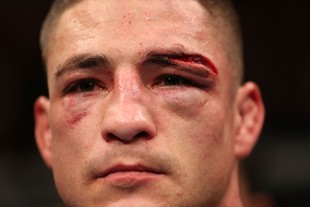 That, though, is what must be done to ensure as best as possible a fighter does not wind up with a serious, life-altering brain injury.
That, though, is what must be done to ensure as best as possible a fighter does not wind up with a serious, life-altering brain injury.
The referee should always stop a bout when one fighter is taking repeated, clean, hard blows to the head and doesn't seem to have the capacity to fend off further onslaughts by either landing significant strikes of his or her own or by strategically moving away from danger.
CTE and other traumatic brain injuries don't go away just because a fighter rallied from the brink of defeat for a heart-pounding win. Referees must be trained to stop fights well before there is a higher-than-average risk of head injury.
Doing so will occasionally rob the fans of an amazing stop-the-presses finish, but if it means all of the fighters return home safely with their wits intact, it's a small price to pay.
Source: http://sports.yahoo.com/blogs/mma-cagewriter/referees-willing-stop-fights-ufc-spotless-safety-record-001357806--mma.htmlRelated Topics: tom hanks Donatella Versace revenge Prisoners freedom tower
No comments:
Post a Comment
Note: Only a member of this blog may post a comment.